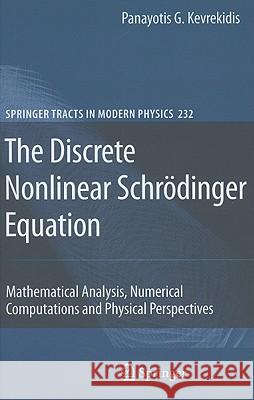The Discrete Nonlinear Schrödinger Equation: Mathematical Analysis, Numerical Computations and Physical Perspectives » książka
The Discrete Nonlinear Schrödinger Equation: Mathematical Analysis, Numerical Computations and Physical Perspectives
ISBN-13: 9783540891987 / Angielski / Twarda / 2009 / 416 str.
The Discrete Nonlinear Schrödinger Equation: Mathematical Analysis, Numerical Computations and Physical Perspectives
ISBN-13: 9783540891987 / Angielski / Twarda / 2009 / 416 str.
(netto: 766,76 VAT: 5%)
Najniższa cena z 30 dni: 771,08
ok. 16-18 dni roboczych.
Darmowa dostawa!
Adventures of nonlinear science were perhaps most notably seeded at the Los Alamos National Laboratory (LANL) over half a century ago with the fundamental questionsofenergyequipartitioninnonlinearsystems, astheywereposedbyFermi, Pasta, and Ulam. At the time, probably little could be imagined of the far-reaching implications that the studies of nonlinear phenomena would have, continuing to expandtothisday.TheGinzburg Landautheoryofsuperconductivityandtheord- parameter descriptions of super uidity, the soliton revolution through the works of Zabusky and Kruskal on the KdV equation and the subsequent widespread - plicationsof the nonlinear Schrodi ] ngerequation in optical bers and Bose Einstein condensates, the developmentsof bifurcationtheory and chaotic dynamicsand their widespread applicationsfrom climate and geophysics, to biological phenomenaand chemical kineticsare only a few of the multiple arenas in which nonlineardynamics have emerged as the appropriate description of important physical systems. I well remember my own early days of nonlinear science appreciation, rst at Cornell University in the early 1970s and then at Los Alamos where we began the Center for Nonlinear Studies (CNLS) in 1980. These were years marked by interdisciplinary discovery and by the recognition that many nonlinear equations have an inherent ability to exhibit both coherence and chaos the beginnings of our appreciation today of spatio-temporal complexity and the functional role that this plays in multiple branches of science, technology, and engineering."











